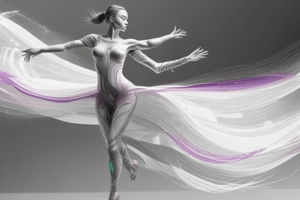Podcast
Questions and Answers
What is the primary purpose of dance as described in the content?
What is the primary purpose of dance as described in the content?
- To facilitate social gatherings
- To compete in sports
- To perform physical exercise only
- To express ideas or emotions (correct)
Which of the following was NOT a purpose of dance in primitive cultures?
Which of the following was NOT a purpose of dance in primitive cultures?
- To sell goods (correct)
- As a means of communication
- To express tribal unity
- To worship the Gods
How did Ancient Greeks view dance in relation to education?
How did Ancient Greeks view dance in relation to education?
- As an integral part of military education (correct)
- As a form of entertainment only
- As irrelevant to academic studies
- As a distraction from military training
What changed about dance during the Roman Empire as described?
What changed about dance during the Roman Empire as described?
Which philosopher emphasized the integration of body and soul through dance?
Which philosopher emphasized the integration of body and soul through dance?
In what way did dance evolve during the Medieval Period?
In what way did dance evolve during the Medieval Period?
What was a common use of dance in early civilizations?
What was a common use of dance in early civilizations?
During which era did dance become condemned by early Christians?
During which era did dance become condemned by early Christians?
What effect does improving body image have on an individual?
What effect does improving body image have on an individual?
Which benefit is associated with lowering body mass index?
Which benefit is associated with lowering body mass index?
How does emotional release impact physical health?
How does emotional release impact physical health?
What is a key advantage of improving joint mobility?
What is a key advantage of improving joint mobility?
Which of the following helps maintain bone density?
Which of the following helps maintain bone density?
What is the result of improving lipid metabolism?
What is the result of improving lipid metabolism?
How does lowering physical tension affect overall well-being?
How does lowering physical tension affect overall well-being?
What role does self-esteem play in group dynamics?
What role does self-esteem play in group dynamics?
What aspect of dance does 'Body' primarily refer to?
What aspect of dance does 'Body' primarily refer to?
Which term describes movements that are nearly identical on both sides of the body?
Which term describes movements that are nearly identical on both sides of the body?
What defines the concept of 'Space' in dance?
What defines the concept of 'Space' in dance?
How is 'Tempo' characterized in the elements of dance?
How is 'Tempo' characterized in the elements of dance?
Which of the following does NOT fall under the element of 'Energy' in dance?
Which of the following does NOT fall under the element of 'Energy' in dance?
What is described as the length of time a movement lasts?
What is described as the length of time a movement lasts?
Which aspect of dance involves the arrangement of long and short movements?
Which aspect of dance involves the arrangement of long and short movements?
What does the element 'Action' in dance refer to?
What does the element 'Action' in dance refer to?
What was a significant cultural event during the middle ages?
What was a significant cultural event during the middle ages?
Which period is associated with the mixture of poetry, music, dialogue, and dance in performances?
Which period is associated with the mixture of poetry, music, dialogue, and dance in performances?
During the 20th century, which types of dance gained popularity alongside classical ballet?
During the 20th century, which types of dance gained popularity alongside classical ballet?
What is one of the physical benefits of dance?
What is one of the physical benefits of dance?
What benefit does dance provide in relation to mental and emotional health?
What benefit does dance provide in relation to mental and emotional health?
Which social benefit is associated with dance?
Which social benefit is associated with dance?
What cultural impact does dance promote?
What cultural impact does dance promote?
Which social dance is not mentioned in the popular dances of the 20th century?
Which social dance is not mentioned in the popular dances of the 20th century?
What characterizes sustained movements in dance?
What characterizes sustained movements in dance?
Which type of movement features a clear beginning and ending?
Which type of movement features a clear beginning and ending?
What is the smallest unit of form in a dance?
What is the smallest unit of form in a dance?
Which characteristic of a good dance ensures that movements fit together coherently?
Which characteristic of a good dance ensures that movements fit together coherently?
What does a motif in dance signify?
What does a motif in dance signify?
Which type of movement is characterized by tracing a curved line?
Which type of movement is characterized by tracing a curved line?
What characteristic of a good dance involves progressive organization of movements?
What characteristic of a good dance involves progressive organization of movements?
Which of the following movements results in a jittery effect through trembling?
Which of the following movements results in a jittery effect through trembling?
Flashcards are hidden until you start studying
Study Notes
Introduction to Dance
- Dance involves rhythmic body movement, often in response to music, with the intent of expressing ideas, emotions, or simply for enjoyment.
- It serves varied purposes including recreation, entertainment, education, therapy, and religious expression.
- Considered an art form, it emphasizes aesthetics and entertainment.
Brief History of Dance
- Primitive Cultures: Dance facilitated tribal unity, courtship, worship, communication, and served therapeutic purposes.
- Pre-Christian Era: Recognized in ancient Egypt through wall art and hieroglyphs; Greeks used dance in military education and as entertainment.
- Ancient Rome: Dance turned brutal, involving slaves in entertainment; later condemned by early Christians.
- Medieval Period: Dance incorporated in rituals like the Latin mass; significant events included the Dance of Death.
- Renaissance Period: Theatrical dance emerged in Italian courts, displaying wealth and political message.
- Classic Period: Ballet combined poetry, music, and dance; public ballet performances known as ballet e entrees.
- Modern Period: 20th century saw the rise of jazz and tap dance alongside classical ballet; included social dance styles such as Foxtrot, Tango, and Rumba.
Benefits of Dance
- Physical Benefits:
- Enhances cardiovascular health and muscular endurance.
- Improves coordination, balance, and flexibility.
- Lowers risk of cardiovascular diseases and body mass index.
- Increases joint mobility and bone density.
- Mental/Emotional Benefits:
- Sharpens brain function and reduces dementia risk.
- Lowers depressive symptoms, boosts self-esteem, and improves body image.
- Social Benefits:
- Fosters a sense of togetherness within groups.
- Encourages positive social interactions and interpersonal relationships.
- Cultural Benefits:
- Promotes cultural values and contributes to individual self-actualization.
Elements of Dance
- Body: Refers to the dancer's physical form and configurations; can be symmetrical or asymmetrical.
- Action: Encompasses all forms of movement in dance, categorized by types of movement executed.
- Space: Involves the area occupied by dancers; important for choreography and movement pathways.
- Time: Relates movement to musical structure, encompassing aspects such as beat, tempo, accent, rhythmic patterns, and duration.
- Energy: The force driving movement; can vary from sustained, percussive, and vibratory to swinging, suspended, and collapsing.
Dance Appreciation and Composition
- Form: The structure that arranges dance ideas into a cohesive sequence, ensuring unity.
- Phrase: A combination of movements that create a unit; units together form sections of choreography.
- Motif: Represents the theme or central idea of a dance; motifs may consist of single or series of movements that convey style or intention.
Characteristics of a Good Dance
- Unity: Ensures phrases connect smoothly, contributing to the overall piece.
- Continuity and Development: Phrases progress naturally, maintaining audience engagement.
- Variety and Contrast: Introduces variations that highlight different aspects of the motif, enhancing engagement.
Studying That Suits You
Use AI to generate personalized quizzes and flashcards to suit your learning preferences.




